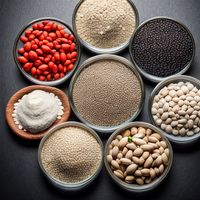Protein is the fundamental building block of life, playing a crucial role in the structure of our hair, nails, muscles, and nearly every cell in our body. It is also a key component in the production of hormones and antibodies.
Therefore, ensuring an adequate daily intake of protein is essential for maintaining good health. The specific amount of protein required can vary significantly based on individual factors such as age, health status, physical activity level, and pregnancy. This article will guide you through determining your daily protein needs, calculating your individual requirements, understanding the potential risks of excessive protein intake, and identifying groups that may require additional protein in their diets.
Calculating Your Daily Protein Requirements
The Institute of Medicine (IOM) provides general guidelines suggesting that adults aged 19 and above should derive 10% to 35% of their daily caloric intake from protein. For a diet consisting of 2,000 calories, this equates to approximately 200 to 700 calories from protein sources. An alternative method to estimate your daily protein needs is to multiply your body weight in kilograms by 0.8 grams of protein. For instance, a woman weighing 68 kilograms (150 pounds) would require about 54 grams of protein daily, while a man weighing 81.6 kilograms (180 pounds) would need around 65 grams.
Examples of Foods Rich in Protein
Protein from Meat, Poultry, and Seafood
For those who primarily consume protein from animal sources, a simple rule of thumb is that 1 ounce of cooked meat, poultry, or fish contains about 7 grams of protein. A serving size of 3 to 4 ounces (approximately the size of a deck of cards) can provide up to 30 grams of protein.
Optimal Protein Intake for Health
While the IOM's recommendations are the minimum to prevent protein deficiency, recent studies suggest that a higher intake, ranging from 1.3 g to 1.8 g per kilogram of body weight daily, may be more beneficial for overall health, particularly in preventing age-related muscle loss. For women, this translates to approximately 88 g to 122 g of protein daily, and for men, 105 g to 145 g.
Individual Variations in Protein Needs
It's important to note that protein requirements are not uniform across all individuals. The distribution of protein intake throughout the day may be as critical as the total amount consumed. Americans tend to consume less protein in the morning and more in the evening, but research indicates that a more even distribution of protein across meals supports muscle health more effectively.
Potential Risks of Excessive Protein Intake
Consuming too much protein can lead to a lack of essential nutrients from carbohydrates and healthy fats. It is advised to limit protein intake to about one-third of your daily caloric intake and not to exceed a rough maximum of 2 g/kg body weight daily. For a person weighing 154 pounds, this would be approximately 140 g of protein per day, and for someone weighing 176 pounds, it would be around 160 g.
Protein Intake and Bone Health
Previous concerns about protein intake increasing the risk of kidney stones or osteoporosis have been largely debunked by recent research. In fact, consuming protein within the higher recommended range may be beneficial for bone health, especially when coupled with adequate calcium intake.
Special Considerations for Different Groups
Vegetarians and Vegans
For those following plant-based diets, adequate protein intake is achievable with a varied diet that includes protein-rich foods such as legumes and soy. The concept of "complete" and "incomplete" proteins is misleading; a diet consisting of various plant proteins throughout the day will provide all essential amino acids, provided sufficient calories are consumed.
Physically Active Individuals
The IOM's guidelines are based on sedentary individuals. For those who are physically active, recommendations from the American College of Sports Medicine and other organizations suggest aiming for up to 2 g/kg of body weight in protein daily, spread throughout the day. Consuming 15 g to 25 g of protein within an hour post-workout can maximize results.
Older Adults
As we age, our bodies become less efficient at converting dietary protein into new muscle mass, leading to gradual muscle loss. Staying active and consuming adequate protein can help combat this. Older adults are advised to consume 1 to 1.5 g of protein per kg daily, with an emphasis on leucine-rich foods to stimulate muscle growth.
Pregnant or Breastfeeding Women
Protein requirements increase during pregnancy, with a minimum of 10 g more per day needed during the second and third trimesters. The IOM recommends a minimum of 1.1 g of protein per kilogram of body weight per day for pregnant women. Breastfeeding mothers also require additional calories and protein to produce milk and recover from pregnancy.
Conclusion
Protein is a vital nutrient, and most people consuming a balanced diet are likely getting enough. It's important to include protein-rich foods throughout the day, not just at dinner. Individuals who may need additional protein, such as those who are active, older, pregnant, or breastfeeding, should be more mindful of their protein intake to ensure they meet their specific needs.

By Daniel Scott/Dec 13, 2024

By John Smith/Dec 13, 2024

By Lily Simpson/Dec 13, 2024

By Victoria Gonzalez/Dec 13, 2024

By Emily Johnson/Dec 13, 2024

By George Bailey/Dec 10, 2024

By Emily Johnson/Dec 10, 2024

By Samuel Cooper/Dec 10, 2024

By Olivia Reed/Dec 10, 2024

By Michael Brown/Dec 10, 2024

By Daniel Scott/Dec 9, 2024

By Grace Cox/Dec 9, 2024

By Olivia Reed/Dec 9, 2024

By Ryan Martin/Dec 9, 2024

By Joshua Howard/Dec 9, 2024

By Lily Simpson/Dec 9, 2024

By William Miller/Dec 9, 2024

By James Moore/Dec 9, 2024

By Eric Ward/Dec 9, 2024

By Samuel Cooper/Dec 9, 2024